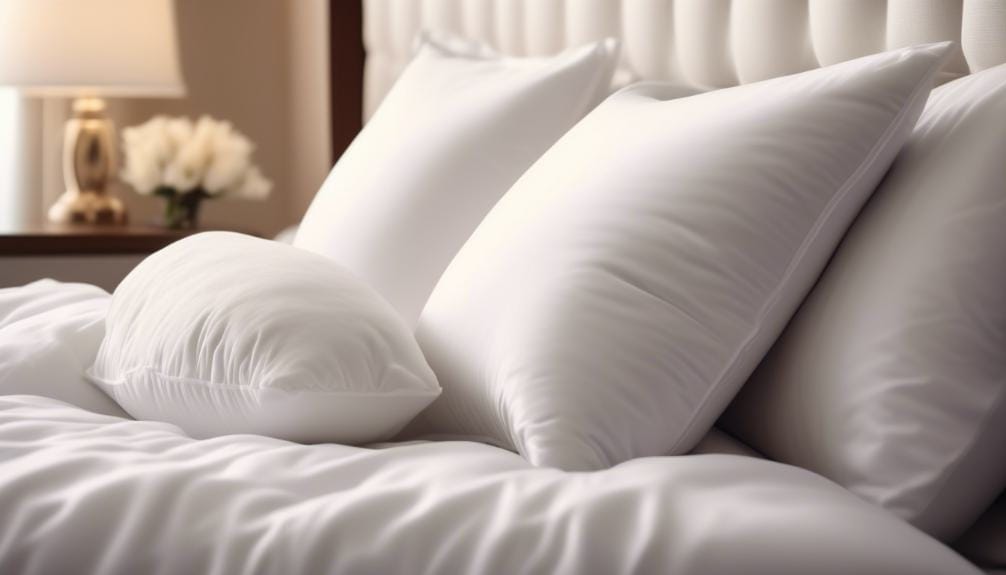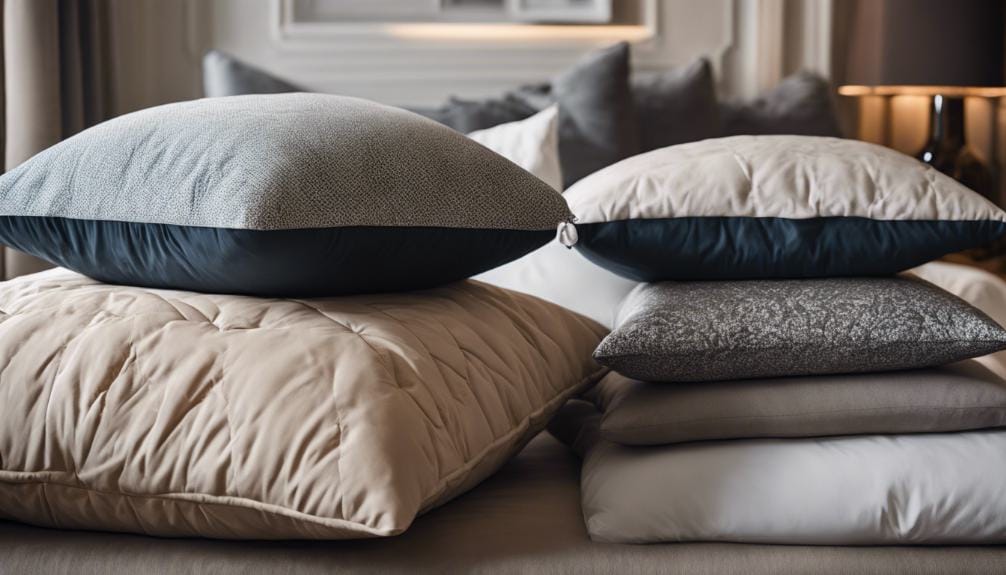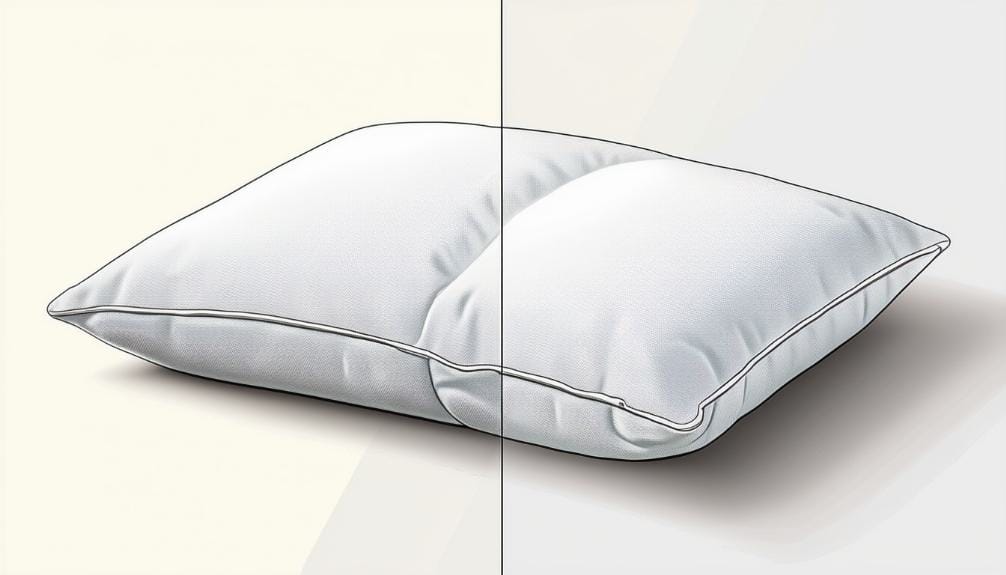Which Pillow Is Best for Sleeping: Soft or Hard? Find Out
You’re about to drift off to sleep, but you’re not sure if your pillow is doing its job. Is a soft pillow the way to go, or would a firmer one provide the support you need? The answer depends on how you sleep – and what your body needs to wake up feeling rested. If you’re a stomach sleeper, a soft pillow might be the ticket, but side and back sleepers may require something more substantial. But what if you’re a mix of all three? Don’t worry, we’ve got you covered. Let’s explore the world of pillows and find out what’s best for you.
Firm Vs. Soft Pillow Differences
Pillow firmness plays a crucial role in providing adequate support and comfort for a good night’s sleep. Two primary categories of pillow firmness exist: firm and soft, each catering to specific sleeping styles and preferences.
Firm pillows offer stable support and are less flexible, making them ideal for side and back sleepers who require consistent support. This type of pillow provides the necessary support for comfort and alignment, which is essential for maintaining proper spinal alignment and reducing strain on the neck and back.
On the other hand, soft pillows are more cushiony and adapt to the shape of your head and neck, providing a plush sensation. They’re suitable for stomach sleepers who require gentle neck support. However, they may not offer sufficient support for side and back sleepers, leading to poor sleep quality and discomfort.
It’s essential to recognize that pillow firmness isn’t a one-size-fits-all solution. Side and back sleepers require firmer pillows to maintain proper spinal alignment, while stomach sleepers benefit from softer pillows that provide gentle neck support.
Pillow Firmness and Sleep Position: What You Need to Know
Your sleep position directly impacts the ideal firmness of your pillow, affecting the quality of your sleep and overall health. During sleep, your body assumes a unique position, requiring specific support and alignment to maintain comfort and prevent discomfort.
Pillow firmness and sleep position are closely linked. The right firmness can make a significant difference in your sleep quality and health.
For side sleepers, firm pillows provide the necessary spinal alignment and support, reducing pressure on shoulders and neck. This support is crucial, as side sleepers often put pressure on their joints, which can lead to discomfort and pain.
Back sleepers require medium-firm pillows, which offer a balance of comfort and support. This firmness helps maintain a healthy sleep posture, keeping the spine aligned and reducing strain on the body.
Stomach sleepers need soft pillows that provide gentle cradling for their head and neck. This softness reduces strain on the spine, promoting comfortable sleep and reducing the risk of discomfort and pain.
Pros and Cons of Firm Pillows

Firm pillows provide consistent support and maintain a neutral position for the neck and spine, making them ideal for side and some back sleepers. This support is crucial because it allows the neck to remain in alignment, reducing strain and discomfort that can disrupt sleep quality. As a result, sleepers can expect to wake up feeling more refreshed and energized due to the reduced pressure on their neck and spine.
On the other hand, firm pillows may not provide sufficient pressure relief, which can be a drawback for certain sleepers. Stomach sleepers, in particular, should avoid firm pillows as they can put excessive pressure on the neck and shoulders, leading to discomfort and pain.
However, for side and back sleepers, a firm pillow can be a vital component of a restful night’s sleep. By keeping the spine in alignment, firm pillows reduce strain on the neck and spine, alleviating back and neck pain.
Pros and Cons of Soft Pillows
Soft pillows provide a comfortable sleeping experience, especially for stomach sleepers, by offering excellent pressure relief and a cozy cradle for the head and neck. However, they may not be suitable for everyone due to some significant drawbacks.
Soft pillows lack the necessary firm support for proper spinal alignment, which can be a problem for side and back sleepers. This can lead to discomfort, pain, and even long-term spinal issues if not addressed.
Regular maintenance is crucial to extend the life of a soft pillow. They require frequent fluffing and rotating to maintain their shape, but even with proper care, they can become lumpy over time, leading to neck pain and discomfort.
Soft pillows generally have a shorter lifespan compared to firmer alternatives, requiring more frequent replacements.
If you’re concerned about these potential drawbacks, consider exploring alternative pillow options that balance comfort and support. Proper pillow maintenance is vital to extend the life of your soft pillow and guarantee a comfortable night’s sleep.
Medium-Firm Pillows: The Best of Both

Medium-firm pillows provide a crucial balance between comfort and support, offering the perfect compromise for a restful night’s sleep. This pillow type caters to combination sleepers who shift positions during the night, as it provides a mix of firmness and plushness. By offering adequate neck support and alignment, medium-firm pillows are versatile and suitable for various sleep styles.
The benefits of medium-firm pillows include:
| Benefit | Description |
|---|---|
| Comfort Balance | Strikes a balance between firmness and plushness, providing optimal comfort |
| Neck Support | Maintains proper neck alignment, reducing strain and discomfort |
| Sleep Quality | Promotes uninterrupted sleep, leading to better rest and recovery |
| Versatility | Accommodates different sleep positions and styles |
| Pain Prevention | Helps prevent neck discomfort and pain by maintaining proper spinal alignment |
Choosing the Right Pillow for You
Determining your ideal pillow firmness requires considering your sleeping position, personal comfort level, and the material used in the pillow’s construction. Sleeping position plays a significant role, as side sleepers often benefit from firmer pillows that keep their spine aligned, while stomach sleepers typically prefer softer pillows that cushion their heads.
To find the perfect pillow, ask yourself these crucial questions:
- What’s my primary sleeping position? Are you a side, stomach, or back sleeper?
- What’s my comfort threshold? Do you prefer a firm, medium, or soft pillow?
- What material do I prefer? Do you like the pressure-relieving properties of memory foam or the luxurious feel of down?
Answering these questions will help you narrow down your options and find a pillow that meets your specific needs, providing the comfort and support you need for a restful night’s sleep.
Pillow Material and Support Level

Pillow material significantly impacts support level, which is critical for achieving comfort and support while sleeping. Different materials offer distinct firmness levels, ranging from soft to extra firm.
The following breakdown outlines popular pillow materials and their corresponding firmness levels:
| Material | Firmness Level | Support Preferences |
|---|---|---|
| Memory Foam | Medium-Firm | Back and side sleepers benefit from this level of support |
| Down | Soft | Stomach sleepers and those who prefer soft comfort find this material suitable |
| Latex | Firm | Back sleepers and those who prefer extra support often prefer latex |
| Hybrid | Medium | This material provides a balance of comfort and support, making it suitable for a wide range of sleepers |
Consider your comfort levels and support preferences when choosing a pillow material. Do you prefer a soft, plush pillow or a firmer one that offers additional support? By recognizing how different materials affect support level, you can make an informed decision that caters to your unique needs.
Personalizing Your Pillow Choice
To get the perfect pillow, you need to assess your unique sleep profile by considering your sleeping position, comfort preferences, and personal needs. This helps narrow down your options and choose a pillow that caters specifically to your requirements.
Three vital considerations for personalizing your pillow choice are:
- Pillow loft options: Side sleepers need thicker pillows to fill the gap between their ear and shoulder, while back sleepers require medium-loft pillows and stomach sleepers need thin ones. This is because pillow loft directly affects spinal alignment and comfort during sleep.
- Neck support levels: If you have neck or back pain, a pillow with adjustable neck support or a contoured design that cradles your cervical spine is crucial. This feature helps maintain proper spinal alignment and alleviates pressure on sensitive areas.
- Material preferences: Soft and plush materials like down or memory foam are ideal for those who prefer extra comfort, while firm and supportive materials like hybrid pillows are better suited for those who prioritize support. Choose a material that aligns with your comfort preferences for a restful night’s sleep.
Frequently Asked Questions
Can I Use a Soft Pillow if I Have a Neck Injury?
If you have a neck injury, you can use a soft pillow, but opt for one with medium support, like memory foam or down alternative, to provide gentle cradling and pressure relief without aggravating the injury.
How Often Should I Replace My Pillow for Optimal Support?
You should replace your pillow every 1-2 years, regardless of the material, to maintain best support and hygiene, and prioritize regular maintenance like fluffing and rotating to extend its lifespan.
Are Hard Pillows Better for People With Allergies?
You’ll find that hard pillows are a game-changer for allergy relief, as their firmness prevents allergen buildup, reducing symptoms like sneezing and congestion, and providing a healthier sleep environment.
Can a Pillow Be Too Soft for Side Sleepers?
You’ll want to avoid a pillow that’s too soft, as it won’t provide enough neck support, leading to discomfort and potential injury. Opt for a firmer pillow to guarantee proper alignment and comfort as a side sleeper.
Do Firm Pillows Help With Snoring and Sleep Apnea?
You’re wondering if firm pillows can help with snoring and sleep apnea. The answer is yes! Firm pillows can help prevent snoring by elevating your head and neck, and the right pillow firmness can reduce sleep apnea symptoms.
Conclusion
You’ve got this! Now that you know the differences between firm and soft pillows, it’s time to choose the best one for you. Consider your sleep position, comfort needs, and personal preferences.
Remember, medium-firm pillows offer a balanced blend of support and comfort. Experiment with different types and materials to find your perfect match.
Don’t forget to prioritize your spinal alignment and neck support for a restful night’s sleep.
